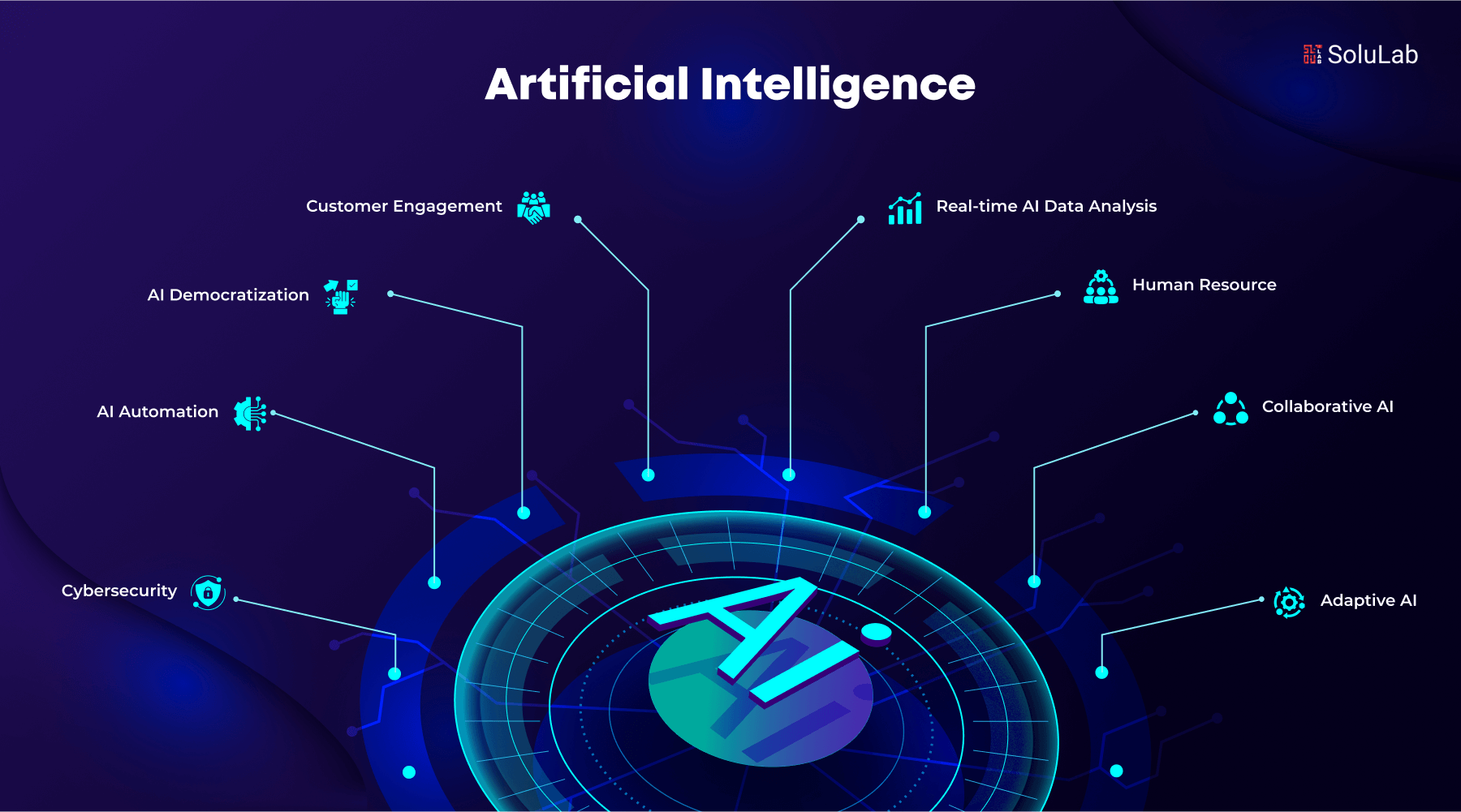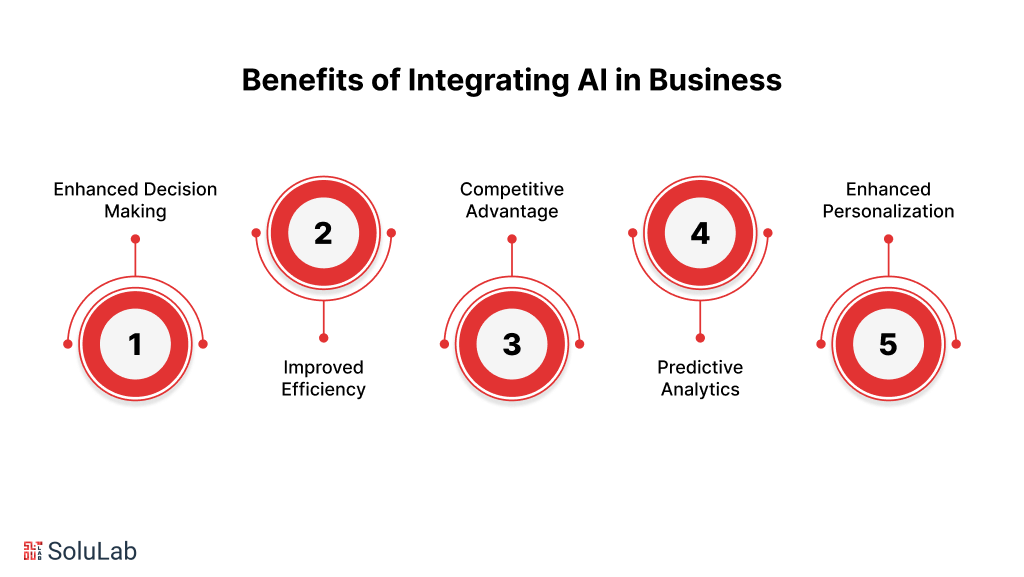
The worldwide artificial intelligence market was valued at USD 196.63 billion in 2023 and is anticipated to expand at a CAGR of 36.6% between 2024 and 2030. The continuous research and innovation led by tech companies are driving the adoption of advanced technologies in various industries, including automotive, healthcare, retail, finance, and manufacturing.
For example, in December 2023, Google LLC introduced “Gemini,” a large language AI model available in three sizes: Gemini Nano, Gemini Pro, and Gemini Ultra. Gemini distinguishes itself from competitors with its inherent multimodal feature.
What Is AI?
Artificial intelligence (AI) encompasses a range of technologies that empower machines to perform tasks traditionally requiring human intelligence. AI systems use algorithms, data, and computational power to mimic human cognitive functions. They can learn and improve their performance over time by analyzing extensive datasets, enabling them to recognize patterns and make connections that might be missed by humans.
The Benefits of AI-Integrated Business Solutions

Integrating artificial intelligence (AI) into business solutions offers a myriad of advantages, encompassing increased productivity, cost-effectiveness, and enhanced customer satisfaction. By leveraging the capabilities of AI, businesses can stimulate growth and innovation through the following channels:
1. Enhanced Decision Making: Artificial intelligence (AI) can analyze vast amounts of data, identify patterns, and make predictions, allowing businesses to make more informed decisions. This includes analyzing customer behavior, market trends, and financial data to gain insights that would be difficult or impossible for humans to uncover. AI can also help businesses assess risk, optimize pricing strategies, and make better hiring and resource allocation decisions. Understanding how artificial intelligence works enables organizations to leverage these insights effectively.
2. Improved Efficiency: AI-powered automation can streamline repetitive and time-consuming tasks, allowing employees to focus on higher-value activities. For example, AI can be used to automate data entry, customer service inquiries, and inventory management. AI can also help businesses reduce errors and improve accuracy by automating tasks that are prone to human error, such as data transcription and financial calculations. These efficiencies are vital in enhancing overall productivity.
3. Competitive Advantage: By using AI technology, businesses can differentiate themselves in the market and stay ahead of the competition. AI can be used to create new products and services, improve customer experiences, and optimize business operations. For example, AI can be used to develop personalized shopping recommendations, create chatbots that provide customer support 24/7, and optimize supply chain logistics. This adaptability helps companies to maintain a competitive edge.
4. Predictive Analytics: AI certifies businesses with predictive analytics by analyzing historical data and identifying trends. This allows companies to anticipate market shifts, customer preferences, and potential challenges before they arise, giving them a proactive edge in decision-making. Businesses can forecast inventory needs, optimize supply chains, and create personalized marketing strategies based on these predictions.
5. Enhanced Personalization: With AI’s ability to process vast amounts of data, businesses can deliver highly personalized experiences for customers. AI systems analyze customer behavior, preferences, and interactions to offer tailored recommendations and services. This personalized approach increases customer satisfaction, boosts brand loyalty, and fosters long-term relationships with clients.
How Software Companies Can Empower Your Business with AI?
2023 marked a pivotal year in technology history, as generative artificial intelligence made a significant debut. As AI continues its advancement, businesses are increasingly recognizing its potential to enhance productivity and introduce new products and services.
However, harnessing AI’s full potential requires careful consideration. Businesses must navigate ethical and technical challenges such as AI bias and hallucinations to maximize benefits while mitigating risks. Here are some recommendations to guide responsible and effective AI adoption:
-
Input Error Reduction
Through its error-reduction capabilities, AI enhances organizational productivity. Humans, prone to making mistakes due to their nature, often encounter data errors resulting from repetitive data handling. As people lose attention and focus over time, mistakes initially identified can go unnoticed. AI-powered systems, on the other hand, minimize errors in all processes, including critical tasks, offering a reliable and consistent approach to data management. This application of AI in business highlights how different types of AI can improve operational efficiency. As organizations explore the AI future, leveraging these technologies can lead to significant advancements in error reduction and overall productivity.
-
Cybersecurity
AI-powered cybersecurity solutions employ system activity monitoring and vulnerability identification to enable IT teams to prevent cyber-attacks. The integration of AI in informational technology has become prevalent, earning a dedicated term: AIOps. AI capabilities encompass task automation, data optimization, and the safeguarding of IT infrastructures. Contrary to popular depictions in 90s movies, the application of AI in the tech industry is not synonymous with impending doom but rather offers substantial benefits. This is similar to the way artificial intelligence in healthcare is revolutionizing patient care through various applications of AI. Just as AI enhances cybersecurity, it holds promise for numerous fields by improving efficiency and effectiveness.
Check our Blog Post: The Role of AI in Modern Cybersecurity
-
Human Performance
Undoubtedly, AI excels in specific tasks where efficiency and speed are paramount, such as multitasking and processing vast amounts of data. However, AI falls short when it comes to tasks that require intuition, empathy, creativity, and soft skills like leadership and conflict resolution. These tasks are inherently human and cannot be easily replicated by AI. Instead of viewing AI as a replacement for humans, firms should embrace it as a tool that enhances human intelligence. By combining the strengths of both AI and humans, organizations can achieve remarkable results. For instance, marketing companies can leverage AI’s analytical capabilities and NLP applications to predict consumer preferences accurately. Additionally, AI as a service allows businesses to integrate advanced technologies without extensive in-house expertise. However, it’s essential to remember that only humans can create marketing campaigns that resonate with customers on an emotional level. Similarly, doctors can use AI to stay updated on the latest medical research and treatment options. But ultimately, it’s the human doctor who can effectively prescribe a treatment plan that considers the patient’s emotional and physical well-being.
-
Customer Engagement
AI personalizes content to engage with new and existing customers, enhancing their experience, and promoting proactive service. This significantly boosts customer satisfaction and loyalty. AI-driven systems operate 24 hours a day, providing constant support to customers through advanced algorithms and natural language processing (NLP). This results in immediate responses and reduced wait times. These sophisticated systems analyze extensive customer data, comprehending individual behaviors and preferences, which enables AI as a service recommendations and proactive problem-solving.
-
AI System
Humans play a vital role in continuously improving AI systems. They can address AI shortcomings such as bias and hallucinations by monitoring AI systems and identifying incidents of bias or hallucination. The University of California, Irvine, conducted research that demonstrated the effectiveness of a hybrid model. In this model, both humans and AI systems analyzed a diverse range of images, resulting in improved accuracy. Businesses should train employees to engage with AI to provide continuous improvement of algorithms. This can help prevent negative outcomes in the short term and the long term, train the technology to incorporate ethical considerations, and prevent future mistakes. Additionally, integrating Generative AI CRM into business processes can enhance customer relationships, while leveraging AI in finance can optimize financial operations and decision-making.
DO YOU KNOW?
“Brazil is expected to register the highest CAGR in the artificial intelligence market from 2024 to 2030.”
-
AI Automation
Artificial intelligence (AI) presents businesses with a powerful tool that offers multiple advantages, one of which is enhancing the efficiency of existing software tools. By automating repetitive tasks such as data entry and content generation, AI empowers teams to redirect their energy and attention toward more pressing matters. This automation not only boosts productivity but also facilitates better decision-making and optimizes economic growth for businesses. AI-powered tools can significantly enhance problem-solving capabilities. These tools provide automated suggestions for solutions, expediting the resolution process and enabling teams to address issues more efficiently. The role of Adaptive AI in this context is crucial, as it allows for dynamic adjustments based on real-time data. Moreover, partnering with leading AI development companies can further leverage these advancements to tailor solutions that meet specific business needs.
Read Blog: AI in Business Process Automation
-
Real-time AI
For AI to fully realize its potential, it must work with data in motion or in real time. Data serves as the nourishment for AI, fueling algorithms and training large language models. The quality of AI systems is directly proportional to the accuracy and freshness of their data. If an AI application is built on erroneous or outdated data, it becomes useless, potentially propagating social biases or amplifying the dissemination of false information. The concept of real-time AI is of paramount importance. These systems can process and respond to data as it streams in. Consider an AI agent conversing with customers; it must be aware if the last item of a product they’re interested in is sold out. In emergencies, real-time AI can accelerate response times, potentially saving lives. For banks, real-time AI can revolutionize fraud detection by analyzing transactions instantaneously and identifying suspicious patterns at unparalleled speeds. This real-time capability is transformative, and AI urges businesses to explore ways to integrate this technology. By doing so, you’ll have access to the most relevant information in the most suitable context, exactly when it’s needed.
-
Data Analysis
At the core of any successful business lies a crucial element: data. As a valuable resource, data demands a robust system to process its immense volumes. Artificial intelligence presents an ethical solution, enabling lightning-fast analysis of both current and historical data. Envision a business where every decision is grounded in data-driven insights. That’s the transformative potential of what is artificial intelligence. No more reliance on speculation and guesswork, as the artificial intelligence definition empowers your company to make informed decisions with confidence. Understanding what is AI artificial intelligence allows businesses to harness its full potential.
-
LLMs Usage
In artificial intelligence (AI), the saying “two brains are better than one” holds, and multiple brains are even more advantageous. Businesses should recognize the importance of adopting multiple Large Language Models (LLMs), the backbone of generative AI, rather than relying on a single LLM. A combination of LLMs enhances the accuracy and reliability of artificial intelligence systems. When one LLM encounters challenges, such as generating a specific type of text, another can step in to compensate. Utilizing specialized LLMs streamlines operations. One LLM might be dedicated to writing, while another focuses on information retrieval. Inexpensive LLMs can handle simple tasks, while more costly ones tackle sophisticated analysis. Alongside multiple LLMs, businesses should prioritize the use of private LLMs over public LLMs. Public LLMs pose significant risks due to their training on public data sets. If prompted skillfully, they can divulge sensitive information, potentially leading to fraud or theft. Private LLMs mitigate these risks by relying exclusively on an organization’s private data and limiting access to authorized stakeholders. Understanding AI artificial intelligence helps define how artificial intelligence works and its definition of artificial intelligence. The artificial intelligence meaning becomes clearer with the recognition of different types of AI and the future of AI.
The Future of AI: Trends to Watch
With new advancements and trends arising that promise to change industries in the coming years. Staying informed about these trends will help businesses use AI to its fullest potential. Here are some key trends shaping the future of AI:
1. AI Democratization: The development of AI platforms and tools is becoming more accessible to businesses of all sizes, allowing companies with limited technical expertise to implement AI solutions. This is achieved through AI as a Service (AIaaS), where pre-built models are available for integration into various operations.
2. Generative AI’s Growth: AI models capable of generating creative content, such as text, images, and even code, are gaining momentum. Applications like Generative AI CRM are enhancing customer relationships by automating personalized responses and predictive customer insights.
3. AI and Ethics: As AI systems become more embedded in decision-making processes, ethical considerations such as bias, fairness, and accountability will be critical. The focus on responsible AI development will drive businesses to adopt frameworks ensuring AI aligns with societal values.
4. Adaptive AI: AI systems are increasingly capable of adapting to new data in real time, enabling businesses to respond swiftly to changes. Adaptive AI applications can be highly valuable in dynamic industries like finance, healthcare, and e-commerce.
5. AI in Hyper-Automation: Businesses are exploring ways to combine AI with robotic process automation (RPA) to achieve hyper-automation, where AI-driven processes are used to automate more complex tasks. This trend will further enhance operational efficiency and reduce costs.
6. Collaborative AI: The future will see more collaboration between human workers and AI agents. AI will handle repetitive tasks while humans focus on creative and strategic activities, enabling teams to work smarter and more efficiently.
How SoluLab Can Help For Businesses Using AI?
In exploring what is artificial intelligence and how it can enhance business operations, it becomes clear that AI artificial intelligence offers extensive potential to transform various industries. By understanding artificial intelligence definition and how artificial intelligence works, businesses can leverage AI in Business to achieve significant improvements in efficiency and decision-making. The artificial intelligence meaning extends beyond mere automation, encompassing a range of applications of AI such as AI in healthcare, AI in FinTech, and Generative AI CRM.
We developed an AI-powered chatbot for Digital Quest, a travel business aiming to improve user engagement and customer service. The chatbot, built using Generative AI, provides personalized travel recommendations and streamlines reservations by extracting relevant data from Digital Quest’s website.
Software companies specializing in AI development play a crucial role in guiding businesses through this technological landscape. SoluLab, with its expertise in AI agents and AI as a service, stands out as a valuable partner for companies looking to integrate artificial intelligence into their operations. By collaborating with AI development Company like SoluLab, businesses can harness the power of AI artificial intelligence to drive growth, optimize processes, and achieve their strategic goals.
FAQs
1. What is artificial intelligence?
Artificial intelligence (AI) refers to the field of computer science focused on creating systems capable of performing tasks that would typically require human intelligence. This includes tasks like learning, reasoning, problem-solving, and understanding natural language.
2. What is AI artificial intelligence?
AI artificial intelligence is a term that emphasizes the use of artificial intelligence technologies to replicate or enhance human capabilities in various applications. It encompasses the tools and methods used to create intelligent systems.
3. What is the definition of artificial intelligence?
The definition of artificial intelligence is the study and creation of computer systems that can perform tasks requiring human-like intelligence. These tasks include recognizing patterns, learning from data, and making decisions based on that information.
4. How does artificial intelligence work?
AI systems function by processing large amounts of data to identify patterns and make predictions or decisions. They use algorithms and machine learning models to analyze data and continuously improve their performance over time.
5. What are the different types of AI?
Different types of AI include various approaches and technologies such as NLP applications, Generative AI CRM, and Adaptive AI. These types range from simple rule-based systems to complex models that can learn and adapt from experience.






